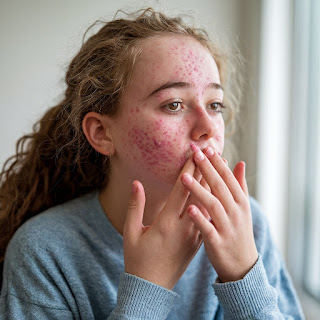Hormonal acne can be incredibly frustrating, especially for adult women who thought they’d left breakouts behind in their teenage years. Understanding what triggers hormonal acne and how it cycles can help you better manage it. Here, we’ll dive into the causes of hormonal acne, the role of lifestyle and skincare in treatment, and how professional treatments can help.
What is Hormonal Acne?
Hormonal acne typically appears as deep, inflamed pimples along the jawline, chin, and cheeks. Unlike occasional breakouts, hormonal acne follows the body’s hormonal fluctuations, often becoming worse before menstruation, during pregnancy, or due to stress. While it’s most common in women in their 20s to 40s, hormonal acne can occur at any age.
Triggers of Hormonal Acne:
1. Hormonal Fluctuations: Estrogen, progesterone, and testosterone levels fluctuate naturally, often resulting in increased sebum production and clogged pores.
2. Stress: When we’re stressed, our body releases cortisol, which can trigger oil glands to overproduce, leading to more breakouts.
3. Diet: Certain foods, particularly high-glycemic foods (like sugar and refined carbs) and dairy, may worsen hormonal acne in some people.
Tips to Manage Hormonal Acne
Managing hormonal acne requires a mix of skincare adjustments, lifestyle changes, and professional help. Here are some strategies that may help control and prevent hormonal acne:
1. Choose the Right Skincare Products
- Topical Retinoids*: Retinoids are a form of vitamin A that help increase cell turnover and prevent clogged pores. They’re highly effective for treating acne but should be introduced slowly to prevent irritation.
- Product Recommendation: Differin Gel (Adapalene) – an over-the-counter retinoid.
- Salicylic Acid: This beta-hydroxy acid penetrates deep into pores to exfoliate and reduce inflammation.
- Product Recommendation: Paula’s Choice Skin Perfecting 2% BHA Liquid Exfoliant.
- Benzoyl Peroxide: Known for its antibacterial properties, benzoyl peroxide can help kill acne-causing bacteria and reduce swelling.
- Tip: Use sparingly as it can dry out the skin; start with a lower concentration like 2.5%.
2. Simplify Your Routine
Using too many products or harsh cleansers can worsen hormonal acne. Aim for a simple routine:
- Gentle Cleanser: Avoid harsh, foaming cleansers; instead, choose a mild, pH-balanced one.
- Lightweight Moisturizer: Don’t skip moisturizer, even if your skin is oily. Look for a non-comedogenic, oil-free option.
- Sunscreen: Retinoids and acne treatments can make skin sensitive to the sun, so a broad-spectrum sunscreen with at least SPF 30 is essential.
3. Lifestyle Adjustments to Support Clear Skin
Hormonal acne isn’t solely about skincare; lifestyle plays a crucial role.
- Manage Stress: Incorporate stress-relieving activities, such as meditation, yoga, or a consistent sleep schedule. Lowering stress levels can help reduce cortisol production.
- Watch Your Diet: Avoid high-glycemic foods and limit dairy if you notice breakouts after consuming them. Instead, eat a balanced diet rich in fruits, vegetables, and omega-3 fatty acids, which are known to support healthy skin.
- Stay Hydrated: Drinking water throughout the day helps flush out toxins, keeping your skin and body healthy.
4. Try Supplements with Caution
Some supplements are thought to help balance hormones and manage acne, but it’s essential to consult a dermatologist before trying them.
- Zinc: Known for its anti-inflammatory properties, zinc can be effective for acne.
- Omega-3 Fatty Acids: Found in fish oil, omega-3s can reduce inflammation and may improve acne for some.
- Spearmint Tea: Some studies suggest that drinking spearmint tea may help lower androgen levels, which can reduce breakouts.
5. Professional Treatments for Hormonal Acne
If over-the-counter treatments and lifestyle changes don’t provide sufficient relief, consulting a dermatologist is essential. They can offer personalized treatments based on the severity and causes of your hormonal acne.
- Oral Contraceptives: Certain birth control pills help regulate hormone levels, which can reduce acne in many women.
- Anti-Androgens (Spironolactone): This medication lowers androgen levels in the body, which can reduce sebum production and prevent breakouts.
- Chemical Peels and Laser Therapy: These in-office treatments can help control acne, reduce scars, and improve skin texture.
- Topical Prescription Retinoids: If over-the-counter retinoids aren’t effective, a dermatologist can prescribe stronger options like tretinoin.
Common Myths About Hormonal Acne
There are a few myths surrounding hormonal acne that can make it confusing to treat. Here are a couple of common ones:
- “Moisturizer Makes Acne Worse”: Many people with acne-prone skin skip moisturizer, thinking it’ll clog pores. The truth is, skipping moisturizer can lead to more sebum production as your skin tries to compensate for dryness.
- “Diet Has Nothing to Do with Acne”: While diet isn’t the sole cause, certain foods can trigger acne in some people. Observing your body’s response to food choices can help identify potential triggers.
Final Thoughts: Finding What Works for You
Hormonal acne can be challenging, but with the right skincare products, lifestyle adjustments, and professional guidance, it’s possible to manage and reduce breakouts. Remember, everyone’s skin is unique, so finding the combination of treatments that works best for you may take time. If you’re feeling overwhelmed or aren’t seeing improvements, don’t hesitate to reach out to a dermatologist who can help tailor a treatment plan for your skin’s specific needs.
Remember, no matter which option you choose, consistency and proper aftercare are key to seeing the best results. If you’re unsure which treatment is right for you, book a consultation at **Dr. Rizwan’s Skin Cosmetic and Laser Clinic** for personalized advice and care.
############################################################################









.jpeg)
No comments:
Post a Comment